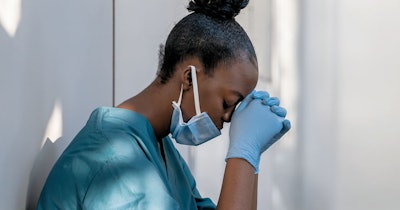
Approximately one in ten National Health Service (NHS) healthcare workers experienced suicidal thoughts during the first year of the COVID-19 pandemic, according to a study.
The University of Bristol-led study, published Wednesday in PLOS ONE, investigated staff at the NHS, the U.K.’s publicly funded healthcare system.
Following several high-profile suicide cases reported in the media, concerns were raised about the risk of suicide among healthcare workers during the pandemic. Researchers sought to investigate the prevalence and incidence of suicidal thoughts and behavior among NHS healthcare workers in England and the effects of occupational risk factors upon their mental health.
The team analyzed responses from the NHS CHECK, the U.K.'s largest survey of the mental health and wellbeing of all NHS staff during COVID-19 and beyond. Longitudinal online surveys were completed by clinical and non-clinical healthcare workers, students, and volunteers in 18 NHS Trusts across England during the COVID-19 pandemic. Responses from 12,514 participants were completed at baseline, and 7,160 participants at a six-month follow-up, between April 2020 and August 2021.
Results highlighted that several modifiable workplace risk factors—including exposure to events that went against a health worker’s moral code, a lack of confidence about raising safety concerns and these concerns being addressed, feeling unsupported by managers, and having to provide a reduced standard of care—all significantly contributed to staff distress during the pandemic, and all increased the likelihood of suicidal thoughts being reported by healthcare workers. At the second six-month follow-up, a lack of confidence about safety concerns being addressed independently predicted suicidal thoughts among clinicians.
“Our analyses show that among healthcare workers who had not experienced suicidal thoughts when first completing the survey, one in ten reported experiencing them six months later. Additionally, almost one in 25 staff reported having attempted suicide for the first time,” co-lead author Dr. Prianka Padmanathan, honorary research fellow at the University of Bristol’s Centre for Academic Mental Health, noted in a statement. “These findings highlight the scale of mental health issues across the NHS at a time of unprecedented concern. Improvements in mental health support and addressing structural issues around workforce and resources might significantly reduce suicidal thoughts and behavior among health care workers.”
“Let’s not forget that having a job is usually better for our mental health than not having a job,” Sir Simon Wessely, NHS CHECK’s chief investigator and professor of psychiatry at King’s College London, added in a statement. “But sometimes the nature of the job can increase stress and strain on the individual. In these cases, this work reminds us that the best source of support to maintain your health and wellbeing are not mental health professionals or the people in charge of your organization. It is the person next above you, and the people around you — your friends, family, and colleagues.”



















